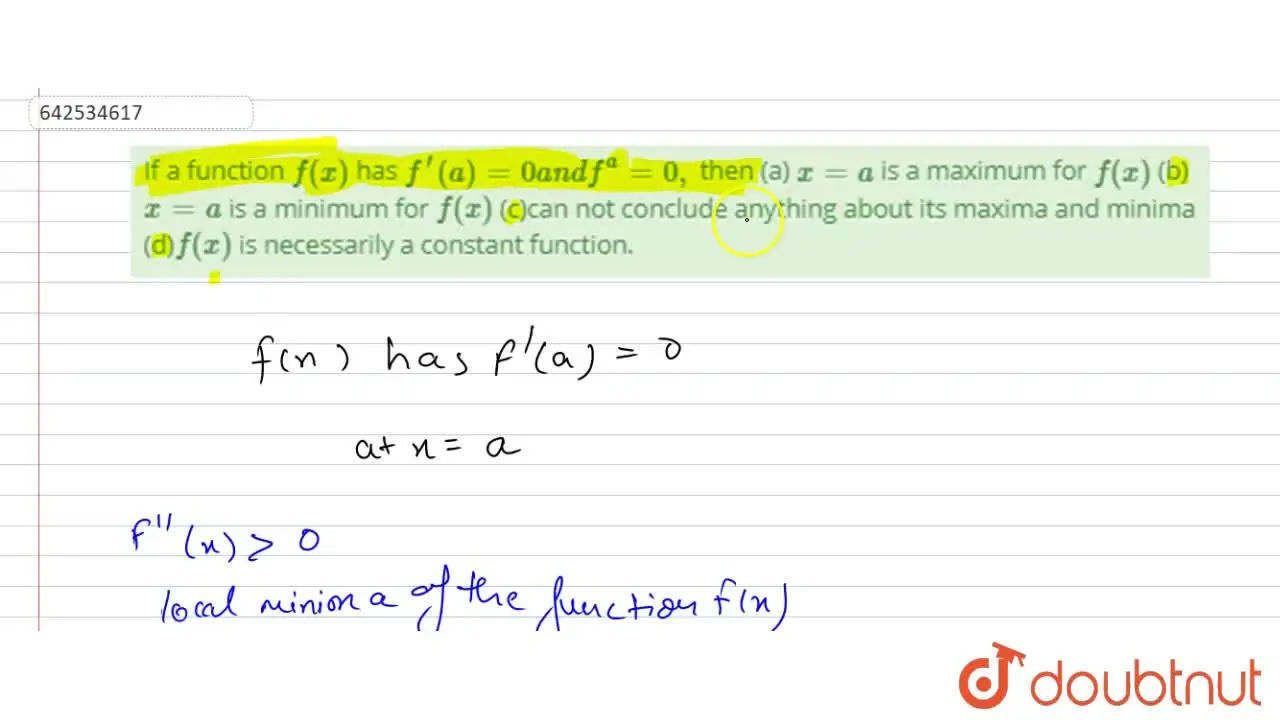If a function f(x) has f′(a)=0andfa=0, then (a) x=a is a maximum for f(x) (b)x=a is a minimum for f(x) (c)can not conclude anything about its maxima and minima (d)f(x) is necessarily a constant function.
Step by step video & image solution for If a function f(x) has f^(prime)(a)=0a n df^(a)=0, then (a) x=a is a maximum for f(x) (b)x=a is a minimum for f(x) (c)can not conclude anything about its maxima and minima (d)f(x) is necessarily a constant function. by Maths experts to help you in doubts & scoring excellent marks in Class 12 exams.
Similar Questions
If f(x)=mx+candf(0)=f′(0)=1. What is f(2)?
View SolutionIf for a function f(x),f′(a)=0,f''(a)=0,f'''(a)>0, then at x=a,f(x) has a (a) minimum value (b) maximum value (c)not an extreme point (d) extreme point
View SolutionLert f:[a,b]→ be a function such that for c∈(a,b),f′(c)=fii(c)=fiii(c)=fiv(c)=fv(c)=0. Then f (a)has a local extermum at x=⋅ f (b)has neither local maximum nor minimum at x=c f (c)is necessarily a constant function (d)it is difficult to say whether a)or(b).
View SolutionA function f such that f'(a)=f''(a)=….=f2n(a)=0 ,
and f has a local maximum value b at x=a ,if f (x) isView SolutionThe function f(x)=xcos(1x2) for x≠0,f(0)=1 then at x=0,f(x) is
View SolutionLet f:R→R be a differentiable function for all values of x and has the property that f(x)andf′(x) has opposite signs for all value of x. Then, (a)f(x) is an increasing function (b)f(x) is an decreasing function (c)f2(x) is an decreasing function (d)|f(x)| is an increasing function
View SolutionLet f be the function f(x)=cosx−(1−x22). Then (a) f(x) is an increasing function in (0,∞) (b) f(x) is a decreasing function in (−∞,∞) (c) f(x) is an increasing function in (−∞,∞) (d) f(x) is a decreasing function in (−∞,0)
View SolutionLet f(x) be a cubic function such that f'(1)=f''(2)=0. If x=1 is a point of local maxima of f(x), then the local minimum value of f(x) occurs at
View SolutionA polynomial function f(x) is such that f'(4)= f''(4)=0 and f(x) has minimum value 10 at x=4 .Then
View SolutionLet f(x) be a function defined as follows: f(x)=sin(x2−3x),x≤0;and6x+5x2,x>0 Then at x=0,f(x) (a) has a local maximum (b) has a local minimum (c) is discontinuous (d) none of these
View Solution


